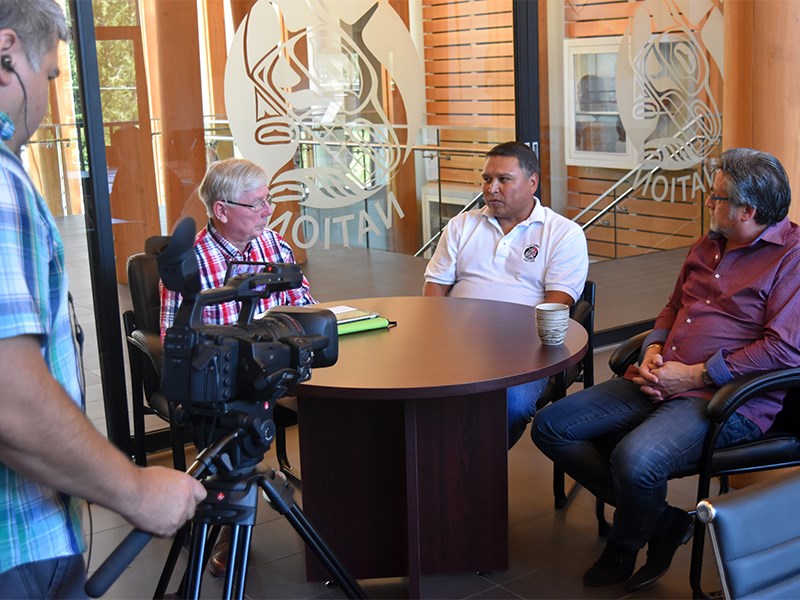For the past 15 years relations between Powell River and Tla’amin Nation have been making strides and strengthening.
Now, for the second time, BC Treaty Commission has made a point of using Powell River and Tla’amin’s experience and relationship as an example of how to get it right for the rest of the province and country.
BC Treaty Commission chief commissioner Celeste Haldane commended the relationship at a press conference for the release of the commission’s annual report and said it provides leadership to other local and regional governments on how they can approach reconciliation.
“It's through dialogue that you can come to a meaningful understanding,” said Haldane. “What you really want is the betterment of the entire community and that’s what Tla'amin is striving to do in partnership with the local and regional governments. That's important because local and regional governments have a role in advancing reconciliation.”
The commission released a report on the relationship in the mid-2000s highlighting the building relationship.
The treaty commission travelled to Tishosem again in July to host a conversation on the relationship between Tla’amin Nation hegus Clint Williams, City of Powell River mayor Dave Formosa and former mayor Stewart Alsgard.
Formosa said he thought it is quite an honour for the relationship to be highlighted.
“It takes two to make these things work,” said Formosa. “I've always been proud of our relationship with Tla'amin Nation.”
Formosa added that the treaty, though not supported by everyone in Tla’amin, has been a significant success for the first nation.
Williams said though it may not seem so at times, the relationship the first nation has with Powell River Regional District and the city is strong.
“It offers the option and potential to work on projects with all three parties talking to one another as equals, not one dictating to the other,” said Williams. “That makes for a much more comfortable working relationship.”
But the relationship has not alway been so comfortable, even back in 2002 it was rocky. At the time, the city was engaged in building its sea walk in Westview and during the process disturbed Tla’amin archaeological sites, including shell middens and petroglyphs.
That led to hiring Tla’amin to help with sea walk construction and the signing of the 2003 Community Accord, a document that still hangs on the wall inside city council chambers. The accord set out principles of cooperation rooted in mutual respect, recognition and understanding that the communities share a common interest in seeing the region prosper.
As the relationship strengthened, Powell River became a vocal supporter of the treaty process. After the treaty process stalled in 2011, Williams asked Alsgard to travel with him and Tla’amin lead treaty negotiator Roy Francis to Ottawa to see if they could move the process forward.
“We were sitting in the treaty process on borrowed money and our bills were racking up and the federal government was not wanting to move,” said Williams. “It was ridiculous because both BC and Tla'amin were waiting for the federal table and we needed to discuss fisheries and other items.”
Williams said to make things even more challenging, former Powell River-Sunshine Coast-Sea to Sky Country MP John Weston was blocking the first nation’s attempts at communicating with the federal government.
“Stewart used his connections and we went office to office meeting with [then Liberal and official opposition leader] Michael Ignatieff and other representatives,” said Williams. “Whether it helped in the end I don't know, but we went and had our voice heard.”
At the time, Weston stated that he had not slowed down the treaty process, but did have concerns over wording in the draft treaty that would allow Tla’amin law to prevail over Canadian law when the two conflicted.
Williams said it was quite awkward when they ran into Weston on the stairs inside the parliament buildings.
“That was quite a trip,” said Williams.
Alsgard said he is pleased to see the treaty commission picking up the Tla’amin story and advancing it now that the treaty has been signed.
"The treaty commission has done just a wonderful job in that they presented this and kept the continuity of the story,” said Alsgard.
Though Alsgard has stepped away from local politics, being a part of the story has been “a huge personal privilege,” he said.
"Personalities have changed," he added, "but the relationship is still there."
Formosa said the city takes pride in the present government-to-government relationship and has helped Tla’amin where it can with zoning advice and by lending its building inspector while Tla’amin was drafting its laws.
Formosa said the Tla’amin treaty was necessary to bring more certainty around aboriginal land and title to the area and has paved the way for the region to move forward together.
“There are still going to be issues though,” said Formosa. “But the Tla’amin have gotten out from under the Indian Act and can get on with their lives.”
While treaties are seen as the highest expression of reconciliation, there are still those in the community who have not made their peace with Canada’s colonial past.
Formosa said that after the Canada 150 celebrations held at Willingdon Beach in June, he was criticized by some residents who thought the celebration was too focused on Tla’amin. He said he asked people why they attend Remembrance Day celebrations on November 11.
“I didn’t go to war and I go to the cenotaph every year,” said Formosa. “We need to continue our reconciliation forever because of what we did in the past and keep working together as we are, as good neighbours, and more and more we win over more people. Powell River is onside for the majority, but we still have work to do.”



